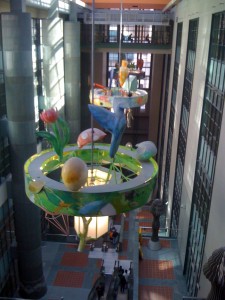Why go to conferences? (Hint: It’s not for the free beer)
As always, I learned a lot at SAS Global Forum this year. It is one of those conferences where there are always two or three sessions going on at once that I would like to attend. I stayed for a bit AFTER the conference because I knew that I would not want to waste any time on sight-seeing while the conference was going on.
 On the way home, I went hiking out in the desert. There are wire fences that are meant to keep you from wandering out into the desert, but the wires are close enough that only a really small person could slip through. Apparently the state of Nevada assumes that if you are that small, there is a responsible adult around somewhere to tell you that it is a bad idea to go slipping through wire fences, climbing over hills and roaming through the desert where our ancestors died of thirst (or somebody’s ancestors, mine were chilling in Venezuela on the Caribbean coast). Since there wasn’t a responsible adult in sight, I did it anyway and it was very nice.
On the way home, I went hiking out in the desert. There are wire fences that are meant to keep you from wandering out into the desert, but the wires are close enough that only a really small person could slip through. Apparently the state of Nevada assumes that if you are that small, there is a responsible adult around somewhere to tell you that it is a bad idea to go slipping through wire fences, climbing over hills and roaming through the desert where our ancestors died of thirst (or somebody’s ancestors, mine were chilling in Venezuela on the Caribbean coast). Since there wasn’t a responsible adult in sight, I did it anyway and it was very nice.
Having foregone hiking, gambling, drinking and other Nevada attractions during the conference to attend every presentation I possibly could, I was surprised when the inimitable Joe Perry told me that he didn’t come to SAS Global Forum every year for the sessions, neither to attend them, nor to present himself, he came for the networking.
It’s true that I did learn more about the NHANES data from talking to Patricia Berglund, but I only talked to her because I had attended her session on survival analysis and wanted to ask a question afterwards. I didn’t talk to Dr. Yung at all, but I learned a lot in his session on structural equation modeling. The same goes for the sessions on forecasting, the Belgian health care database, hash tables and cluster analysis that I attended. (Okay, well I didn’t learn a lot I didn’t already know about cluster analysis, but I learned a little bit, which made it worth while.) I still have drafts of three more posts about what I learned saved on my iPad, and two of those are about sessions I attended.
On the other hand, I learned a whole, whole lot about the new JMP interface for structural equation modeling by corralling Wayne Watson for half an hour. Last year, I met with an incredibly helpful person from SAS (I am 90% sure his name was Robbie) who showed me a lot about high performance computing.
I have exactly once gotten a consulting job from someone who saw me present at a conference (it was WUSS, actually). I think the company was giving out bonuses for referrals at the time and when they asked if he could recommend anyone, he said, “There was this woman I saw …”. The profit off of that contract alone paid for every SAS conference I will attend in my life, and just about every conference of any type. But it only happened once and that was a decade ago, and I didn’t even actually even meet the gentleman officially until a year or so later.
And back to Joe Perry who provided a very useful insight. We were talking about a presentation he gave at WUSS a few years ago on managing software projects. I told him that I did not do a lot of the software architecture design that he emphasizes because much of what I do is “throw away programming”, not that it is so bad that it is garbage, but rather one-off projects, where I am doing an analysis for the final report of some program, for example. “Final” meaning the project is over. Joe suggested that perhaps if I spent more time designing and documenting those one-off projects I could re-use parts of them. The more I thought about it, the more I thought he was right. There are reasons I have not done it that way in the past, but the truth is, they aren’t very good reasons. So, I am going to try changing the work allocation a bit on my current projects and see how it goes. If it really does make us even 5-10% more productive, then, from a financial point of view, that would make it the most worthwhile thing that ever came out of a conference.
But then … there’s the fact that I never would have met Joe in the first place if I hadn’t attended his presentation …
In fact, I’m going to go to LABSug this summer, to WUSS in the fall (where I’ll be presenting SAS Essentials) and to SGF next year. I’m also heading out to the Consortium of Administrators of Native American Rehabilitation meeting in Green Bay, where I’ll be a presenter, and to the SANDS meeting in San Diego, where I’ll also be presenting on using SAS for statistics in some very innovative and fun ways.
 I’ve come to the conclusion that conferences for me are like the public libraries (which I love – if you are ever in downtown L.A., the central library, pictured at left, is worth a visit).
I’ve come to the conclusion that conferences for me are like the public libraries (which I love – if you are ever in downtown L.A., the central library, pictured at left, is worth a visit).
You go there to find the information you are seeking, but if you are sensible, you take an hour or so extra to wander around to learn about things you never knew existed.
So, I think I’ll keep going to the sessions for a while yet.
I write a lot of throw-away Stata programs with a mind that I might reuse them later. I go to the trouble of structuring them properly, of letting them take arguments and return values, and I document everything carefully. Most of the time, I do not reuse these programs. I have a wide enough variety of projects that the code doesn’t transfer readily. You can make code more portable by making it more abstract, but that has obvious drawbacks of its own. Still, I haven’t given up on trying.
So, I do attempt some abstraction. I try to stop before I paint myself into a corner, but I don’t mind if I sometimes get carried away. I figure that the more I make this kind of mental effort a routine, the easier it gets, and then I am better able to deploy it judiciously. I also hope that if I write code like this, even if the rate at which I get to reuse programs themselves stays small, the rate at which I retain a growing library of programming patterns in my head is still large enough to make it worthwhile.
Gabi –
I think you are right, there are benefits to trying to make programs re-usable, in addition to the obvious one that, hey, you might be able to re-use this some day.
As I said, my reasons for not doing it haven’t been good ones, often that I just did not want to take the time at the moment. There is also, as you note, a tendency to get carried away and spend far more time on something than I intended. I’m starting to come to the conclusion, though, that is not always a bad thing.